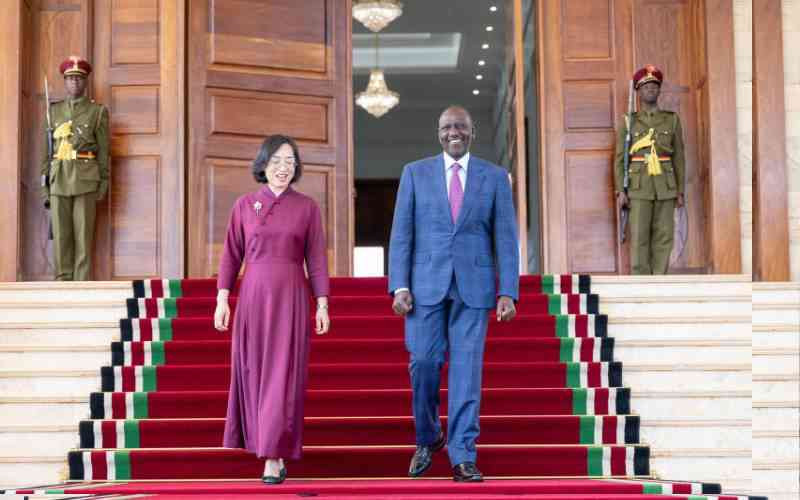
The planned dissolution, restructuring and merge of at least 87 State Corporations will save taxpayers Sh6.3 billion.
Yesterday, Cabinet Secretary of Education Julius Ogamba yesterday said that as of January 2025, State corporations had pending bills amounting to Sh94.45 billion.
While meeting with the Senate Committee on Education in Mombasa, Ogamba said that on January 21, 2025, the Cabinet approved state corporation reforms as proposed by the National Treasury to enhance accountability in the governance of state corporations as part of austerity measures by the treasury.
“National Treasury, as of January 2025, state corporations had pending bills to the tune of sh94.45 billion, which they are unable to pay and would seek funding from the National Treasury.
The proposed reforms are projected to result in savings of Sh6.3 billion,” said Ogamba.
He said the reforms are intended to consolidate financial sustainability by expanding revenue collection and bettering expenditure control.
The CS said the reforms also seek to address operational and financial inefficiencies, enhance service delivery, and reduce reliance on exchequer support.
Ogamba told the Senate Committee that 42 state corporations will be merged into 20 entities to improve operational efficiency and eliminate redundancy, while 25 state corporations will be dissolved, with their residual functions being transferred back to their parent ministries.
“Six state corporations will be restructured to align their mandates for improved performance, and four public funds currently categorised as state corporations will be declassified, and their functions transferred back to the relevant ministries,” said Ogamba.
A further 13 professional bodies, which are currently categorised as state corporations, will also be declassified.
Ogamba noted that part of the reforms will see the Universities Fund and the Higher Education Loans Board both administer funds to university and tertiary students.
Also to be merged is the Kenya Universities and Colleges Central Placement Service (KUCCP).
He noted that the Universities Fund administers scholarships for university students pursuant to the Universities Act, 2012, while the Higher Education Loans Board, on the other hand, administers loans for tertiary education students in line with the Higher Education Loans Board Act, 1995.
“These entities support the same stakeholders, and merging will enhance accountability in funding students and degree programmes and harmonise the operations of the funding agencies and enable them to deliver a ‘funding mandate’ as one,” said Ogamba.
He said the same will reduce duplication of efforts and curb the wastage of resources that attends to inefficiencies where mandates and functions overlap.
Stay informed. Subscribe to our newsletter
The CS said the merger will also lead to evidence-based decision-making in funding higher education, with each agency contributing its experience and evidence to a coordinated process.
He said the inclusion of KUCCPS within the same legislative framework will ensure greater coherence in the implementation of the new funding model in the higher education sector and remove the current legislative incoherence where KUCCPS is supposed to support both TVET and university sub-sectors while anchored in the law for universities only.
Also to be merged are the Commission for University Education (CUE), the Technical and Vocational Education and Training Authority (TVETA) and the Kenya National Qualifications Authority (KNQA).
“We are therefore working with the National Treasury on the possibility of strengthening the regulators (CUE and TVETA), as well as KNQA, and weaning them off the Exchequer. This will help maintain operational efficiency from a technical standpoint while also achieving cost-effectiveness,² said Ogamba.
He said that the Centre for Mathematics, Science and Technology Education in Africa (CEMASTEA), the Kenya National Commission for UNESCO and the National Council for Nomadic Education in Kenya (NACONEK) are proposed for dissolution and their functions transferred to the Ministry of Education.
The CS said there are recommendations to recast NACONEK to the National Council for Marginalised Communities in Education (NACOMACE) and expand the mandate to specifically include the school feeding programme.
He said that the Jomo Kenyatta Foundation (JKF) and the School Equipment and Production Unit (SEPU) are proposed for dissolution because their functions can be performed by the private sector.
“The Presidential Working Party on Education Reform recommended that JKF be recast as the Kenya Basic Education Bursaries and Scholarships, for coordinated management of scholarships. This will be the entity to administer the harmonised framework for managing scholarships,” said Ogamba.
He said that SEPU, on the other hand, was proposed to be re-established as the entity for the procurement and distribution of learning and instruction materials.
"The recommendations of the Presidential Working Party on Education Reform have already been harmonised into draft bills and a draft sessional paper, which we are working to present to the Cabinet jointly with the National Treasury and the Attorney-General," said Ogamba.








